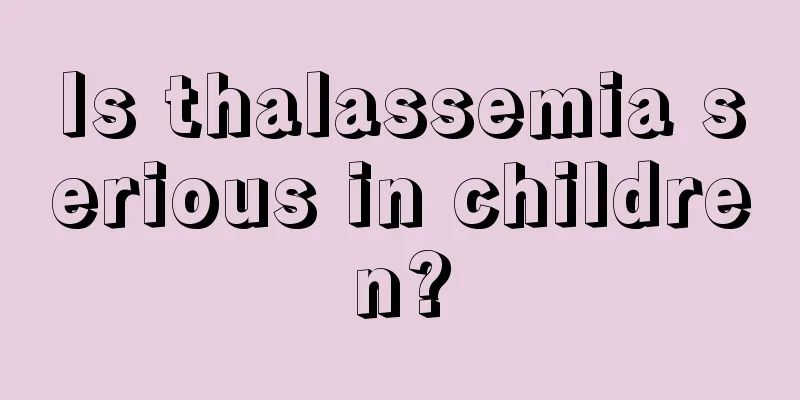Is thalassemia serious in children?

|
For parents, what they hope most is that their babies can grow up healthily. However, in real life, no baby has a smooth growth period. They will always encounter some problems, especially physical illnesses. After all, the baby's body resistance is relatively weak and is more susceptible to external factors. So the question is, if a child suffers from thalassemia, is it serious? 1. What is thalassemia? In my country, thalassemia is one of the genetic diseases with the highest incidence and the greatest impact. According to relevant data, in the southern provinces of my country, the thalassemia gene carrier rate is 1-23%, especially in Guangdong, Guangxi and Hainan. Thalassemia can usually be divided into two types: α-type and β-type. Due to defects in the globin gene, the composition of hemoglobin changes, and in severe cases, hemolysis and anemia occur. 2. What are the symptoms of thalassemia? Silent type: Most people just carry the Mediterranean gene without any symptoms, and it is usually discovered during a physical examination. Moderate to severe cases: Different degrees of gene defect will manifest clinical symptoms of varying severity, mostly chronic progressive hemolytic anemia, facial changes, hepatosplenomegaly, and even life-threatening. Severe cases may cause bone enlargement, enlarged head, raised forehead, collapsed nose, wide-set eyes and other facial changes due to long-term anemia and compensatory hyperplasia of the bone marrow. 3. What is the difference between thalassemia and iron deficiency anemia? Thalassemia is a hereditary anemia that cannot be cured by medicine. Other types of anemia can be mostly prevented and treated. For example, iron deficiency anemia is common in babies. It is mainly caused by insufficient iron in the body due to untimely addition of complementary foods. It can usually be cured through food therapy, and severe cases can be cured through drug therapy. 4. Is thalassemia contagious? Thalassemia is a hereditary disease caused by a gene defect and is not contagious. 5. Diagnosis and Treatment The diagnosis can be made based on blood test results and family history. Mild patients have no symptoms, their normal growth and development are not affected, and no treatment is required. But don't ever believe that iron supplements or nutritional supplements can cure the disease, as you may fall into this misunderstanding and spend more money. If the condition is severe, iron-containing drugs and foods must be restricted in the diet, and blood transfusions must be repeated to maintain normal physiological functions. Blood transfusion will increase the iron content in the human body. In addition, people with thalassemia have too much iron in their bodies, so iron removal treatment is necessary to maintain life. For severe patients, splenectomy may be performed if necessary, but the only way to cure the disease is currently through hematopoietic stem cell transplantation. |
<<: What to do if the baby is scalded by hot water
>>: How to treat febrile seizures in children?
Recommend
What are the symptoms of lysine deficiency in children?
Our bodies need lysine for normal development, an...
What are the causes of baby's gurgling stomach and frequent farting?
Many babies have rumbling stomachs and often fart...
What should I do if my four-year-old child suffers from long-term constipation?
Many children will have some eating problems afte...
Treatment of children with fever and high white blood cell count
In fact, it is very difficult to take care of chi...
Is it a problem if the baby breathes loudly?
Children's breathing is of great concern to p...
Can children drink monk fruit water when they have a cough?
Parents are often very worried when their childre...
How old can a newborn baby drink water?
When a newborn is just born, the mother may not h...
Why is the baby's stool sticky and mushy?
It is well known that whether a person has a dise...
What are the benefits of eating pig tails for children?
Pork can be said to be the most common type of me...
What should we pay attention to in the life of children with glomerulonephritis?
Pediatric glomerulonephritis is actually a chroni...
How to deal with foreign matter in baby's eyes
Eyes are the windows to the soul. For every newbo...
Will a scratch on a child's face leave a scar?
No matter it is a boy or a girl, if there is a ch...
What should children eat if they are zinc deficient?
There are many trace elements in human body, whic...
Baby's eyes turn purple
Adults are prone to dark circles due to frequent ...
What is the reason for the white spots on children's fingernails?
In our lives, we are usually very concerned about...









